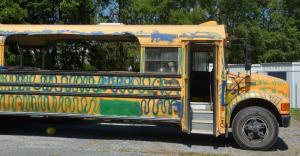Share:
Picking melons was rite of passage
August 12, 2016
I passed a picking crew this week on my travels and the memories started to flow. This is prime watermelon time.
It's hard to believe I was a watermelon picker during my summer teen years growing up in Seaford in western Sussex County. There wasn't anything pleasant about the work – it was physically demanding, dirty and hot. And stepping in a rotten watermelon at 7 a.m. is not a great way to start the day.
In the 1960s and early 1970s, summer jobs were not as plentiful as they are today so many of us turned to farm labor to make money. And the place to go was the Laurel Auction Market – known to us as "The Block."
The Block was the center of the universe as far as watermelons were concerned. Hundreds of farmers lined up their trucks the night before in the two auction lines in hopes of getting a good price for their melons from buyers who were there to ship melons to big metropolitan areas such as New York City.
My neighborhood friends and I would get to The Block early each morning and usually work very late. Until one of my older friends got his driver's license, we sometimes hitched rides to Laurel.
We not only helped pick melons in the field and load them in trucks or wagons, but we also drove the melons through the auction with specific instructions from the farmer on a price.
If sold, we would then unload the truck or trailer onto the buyer's truck. That process was repeated hundreds of times each day at The Block.
When I didn't work for a farmer, I would have to walk the auction line and ask the driver if they needed help unloading their melons. If hired, I would wait for the truck and then hop on after the sale. It was up to the drivers to pay what they thought was fair.
I was based out of The Block for most of the five years I was a farm laborer. One summer my friends and I were fortunate enough to get hired by a farmer in Bethel instead of going to The Block. It was great to get a weekly paycheck for the first time. And because I was the smallest of the group of pickers, I usually drove the tractor in the field while my friends cut and picked melons and lopes.
The most we ever made was about $100 a week.
The Block is still a beehive of activity this time of year, but gone are the days of wide-eyed teenagers looking to make a dollar. Most sales are high volume, and assembly lines are set up to load melons directly onto tractor trailers. In addition, many farmers sign deals with buyers who pick and load melons in the fields, bypassing The Block.
Even so, watermelons and cantaloupes are still big business in Sussex County. For farmers willing to use it, modern agricultural technology has all but taken the weather equation out of growing melons. They are planted under black plastic and fed water and nutrients by tubes running under the plastic as they break through the plastic and start to grow.
The only part that hasn't changed is that melons still have to picked in the field and loaded onto trucks or wagons.
It's hard to believe I was a watermelon picker during my summer teen years growing up in Seaford in western Sussex County. There wasn't anything pleasant about the work – it was physically demanding, dirty and hot. And stepping in a rotten watermelon at 7 a.m. is not a great way to start the day.
In the 1960s and early 1970s, summer jobs were not as plentiful as they are today so many of us turned to farm labor to make money. And the place to go was the Laurel Auction Market – known to us as "The Block."
The Block was the center of the universe as far as watermelons were concerned. Hundreds of farmers lined up their trucks the night before in the two auction lines in hopes of getting a good price for their melons from buyers who were there to ship melons to big metropolitan areas such as New York City.
My neighborhood friends and I would get to The Block early each morning and usually work very late. Until one of my older friends got his driver's license, we sometimes hitched rides to Laurel.
We not only helped pick melons in the field and load them in trucks or wagons, but we also drove the melons through the auction with specific instructions from the farmer on a price.
If sold, we would then unload the truck or trailer onto the buyer's truck. That process was repeated hundreds of times each day at The Block.
When I didn't work for a farmer, I would have to walk the auction line and ask the driver if they needed help unloading their melons. If hired, I would wait for the truck and then hop on after the sale. It was up to the drivers to pay what they thought was fair.
I was based out of The Block for most of the five years I was a farm laborer. One summer my friends and I were fortunate enough to get hired by a farmer in Bethel instead of going to The Block. It was great to get a weekly paycheck for the first time. And because I was the smallest of the group of pickers, I usually drove the tractor in the field while my friends cut and picked melons and lopes.
The most we ever made was about $100 a week.
The Block is still a beehive of activity this time of year, but gone are the days of wide-eyed teenagers looking to make a dollar. Most sales are high volume, and assembly lines are set up to load melons directly onto tractor trailers. In addition, many farmers sign deals with buyers who pick and load melons in the fields, bypassing The Block.
Even so, watermelons and cantaloupes are still big business in Sussex County. For farmers willing to use it, modern agricultural technology has all but taken the weather equation out of growing melons. They are planted under black plastic and fed water and nutrients by tubes running under the plastic as they break through the plastic and start to grow.
The only part that hasn't changed is that melons still have to picked in the field and loaded onto trucks or wagons.
Working with Florida crews
Thinking back, it's a miracle we survived. On occasions, we would get hired for the day to pick with migrant workers called Florida crews, and we never knew where we would go. One day we ended up on a field on the Eastern Shore of Virginia and didn't get back to Laurel until way after dark.
The life of the migrant workers was not a good one. I'm sure most we were worked with had shady pasts and criminal records. Some of them actually lived in those old school buses used to transport melons you see on the roads in rural Sussex County.
Thinking back, it's a miracle we survived. On occasions, we would get hired for the day to pick with migrant workers called Florida crews, and we never knew where we would go. One day we ended up on a field on the Eastern Shore of Virginia and didn't get back to Laurel until way after dark.
The life of the migrant workers was not a good one. I'm sure most we were worked with had shady pasts and criminal records. Some of them actually lived in those old school buses used to transport melons you see on the roads in rural Sussex County.
























































